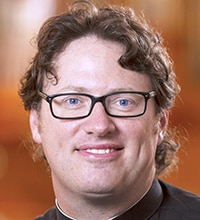
The point seems to be symbolic. Jesus here is among Samaritans. Possibly, the number alludes to all the nations beyond Israel; since the so-called “Table of Nations” in Genesis 10, the number 70 has evoked all the peoples of the world. Perhaps it signals the later Christian mission to bring the Gospel to all the world. The number 70 may also allude to Moses; he appointed 70 elders, you’ll remember, to help him bear the burden of leadership (cf. Nm 11:16-30). Jesus is likened repeatedly to Moses’ successor (Acts 3:22-23); and so, possibly, here we see Jesus doing another Moses-like thing. Whatever the allusion, the point is mission. Assuming these believers left everything to follow Jesus, leaving the dead to bury the dead, they’ve become missionaries (Lk 9:57-62). That is, they’ve become what we’re all meant to be — missionary disciples who go before the Lord to prepare his way.
| July 3 – 14th Sunday in Ordinary Time |
|---|
|
Is 66:10-14 |
Thus, this passage teaches us a few things about what it’s like to be missionary disciples.
First is that we’re disciples together. Reading this passage, Origen was struck by the little detail that these disciples were sent out on mission not as individuals but in pairs. This seems “an ancient practice,” Origen noticed, at least since Moses and Aaron, Joshua and Caleb, Paul and Barnabas and others. And the lesson here is simple: There are no “Lone Ranger” missionary disciples. To be on mission, one must also be in relationship, in communion with others. Clearly, there is a lot of work to do — the “harvest is abundant” — so missionary disciples must be willing to support one another.
The mission also demands purity and holiness; we must be like lambs to the world’s wolves. Missionary disciples will face hostility, Jesus said repeatedly. Nonetheless, the mission is urgent, and we’re to depend on God rather than our own resources. We mustn’t fool ourselves into thinking that our power or wealth will bring about the Kingdom, but only God’s power. That’s why missionary disciples shouldn’t accumulate too much wealth, because it can fool us into thinking it’s our mission and our success. No! We must rely on God alone, working diligently for his kingdom and not ours.
And, of course, what we bring to the people of the world is Christ’s peace, the same peace he gave the disciples after his resurrection (cf. Jn 20:19-29). It’s the peace born of forgiveness. This is the peace missionary disciples offer, the peace of reconciliation (2 Cor 5:19). It’s a gentle peace, not coercive at all, beyond all understanding (Phil 4:7). And people either can accept the peace of Christ or reject it; it’s glorious when they do, mysteriously sad when they don’t.
But all of that is really God’s business, not ours. As missionary disciples, our job is simply to continue to preach and proclaim the Kingdom of God. We are not Christ. We are merely his heralds. We’re witnesses and servants of the Gospel, not its creators. What God’s ultimate victory looks like is up to him. We simply trust in that victory, trusting in Jesus because he saw Satan fall like lighting (cf. Lk 10:18). Our task — as faithful missionary disciples — is simply to rejoice that our names are written in heaven, that we’ve been found good servants. But that is, of course, the pressing question: Are we faithful missionary disciples?
Father Joshua J. Whitfield is pastor of St. Rita Catholic Community in Dallas and author of “The Crisis of Bad Preaching” (Ave Maria Press, $17.95) and other books.





